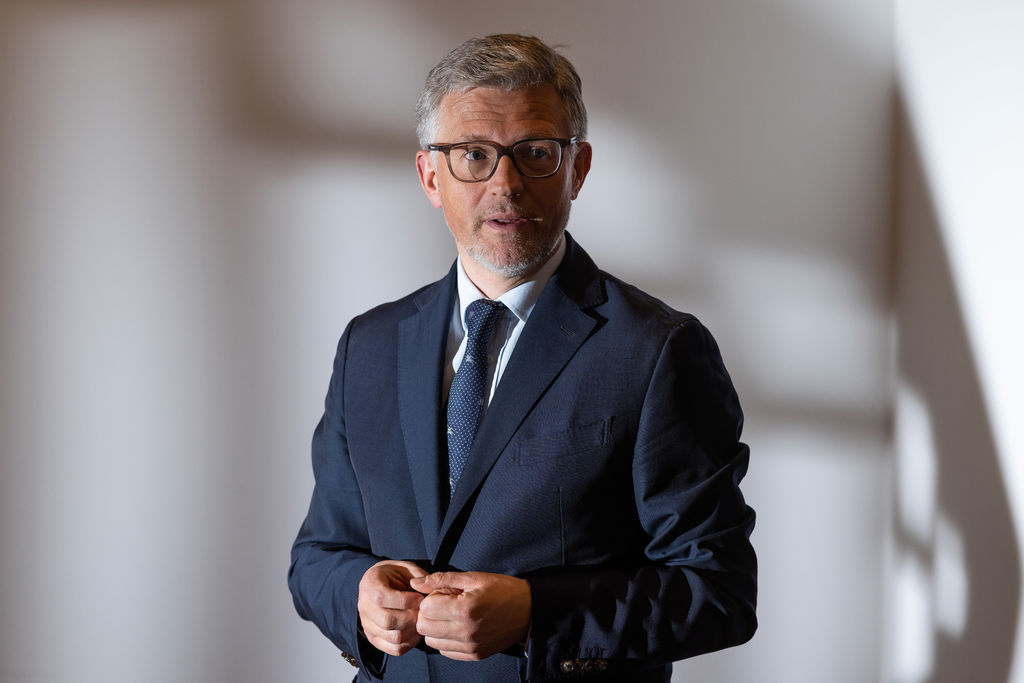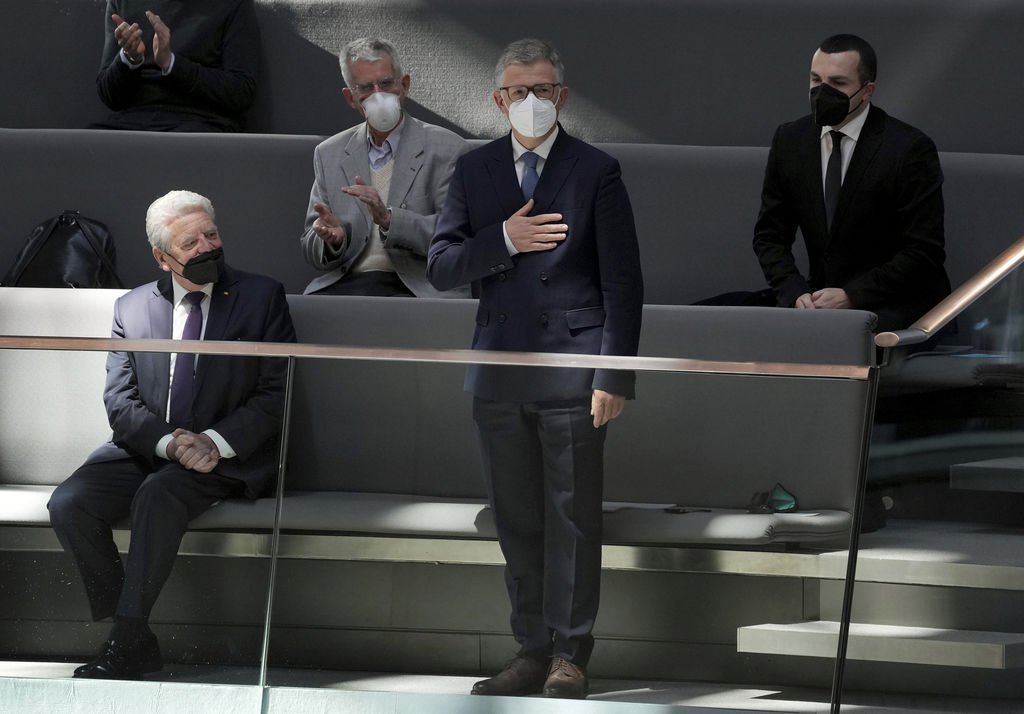There is no other diplomat feared in political Berlin like Andriy Melnyk. Where everyone is talking about strategy, he is talking about life and death.
By Livia Gerster

Andriy Melnyk knows that German attention is fickle. That’s why he takes every opportunity to explain to them what’s at stake “as long as someone still wants to see and hear me”. Germans have gotten used to the ambassador broadcasting from a talk show to their living room night after night, always dressed as elegantly as he speaks. A German that you can envy him for, also because he finds words that are stronger than ours. “Small carat” is such a word.
For example, the Bundestag’s reaction to the Ukrainian President’s speech last week is small-scale.
Andriy Melnyk sits there in the grandstand and kneads his hands. “We have said again and again that Nord Stream is a preparation for war,” says Zelensky from the screen. Olaf Scholz sits small in his swivel chair and looks up at him. Melnyk blinks behind his glasses.
The “we” that Selensky speaks of means above all him, the Ukrainian ambassador in Berlin. He has repeatedly criticized the construction of the pipeline, and when he felt it was necessary, so did Frank-Walter Steinmeier. He didn’t feel heard. When Melnyk knocked at the Foreign Ministry or the Chancellery, they didn’t even open the door. There has been a kind of house ban for Melnyk there for years.
“Dear Chancellor Scholz,” says Selensky with dark circles under his eyes. “Give Germany the leadership role it deserves.” Melnyk can only see the back of the Chancellor’s head, surrounded by black headphones through which the interpreter’s voice is speaking. Then the screen goes black, Scholz is silent and Selensky’s appeal falls on the agenda.
Melnyk does not delete his tweets
Melnyk didn’t want it to happen like this. Two days earlier, he asked Olaf Scholz to react to the speech and make a government statement. The SPD found that presumptuous. State Secretary Sören Bartol wrote on Twitter that he “now finds this ambassador unbearable”. He put the word “ambassador” in quotation marks.
Melnyk doesn’t know Bartol, but he can understand him. “He was just reflecting the mood in the faction,” says Melnyk, and it sounds as if he feels sorry for Bartol. Melnyk knows that many in the SPD think like Bartol, but don’t say it. Melnyk prefer those who speak their minds.
“What can you do when you’re angry? Send a nasty tweet.” He often feels the same way. “You are a real Ar. . .” he writes, for example, to a politics professor who calls on Ukraine to capitulate. “Shut your left mouth,” he writes to left-wing MP Fabio de Masi, who wants to discuss Nazis in the Ukrainian army. Unlike Bartol, Melnyk does not delete his tweets.
Downstairs in the plenary hall, the Vice President of the Bundestag congratulates two members of parliament on their sixtieth birthdays. You’ve only experienced peace and freedom for six decades, and now it’s supposed to be about compulsory vaccination, without transition, without discussion. Melnyk gets up, he has no more business here. In the morning his friend’s house in Kyiv was bombed. “He recently painstakingly renovated the apartment.”
Direct line from Stalin’s hunger terror to Putin’s attack
He strives for the exit, the cameras strive after him. The Green veteran Marieluise Beck attaches herself to him. The two have a complicated relationship. Beck is one of those foreign policymakers who have always viewed Russia with a clear perspective. Your friendship with Ukraine is unshakable. But the one about Andriy Melnyk got deep cracks two years ago. At that time it was about the Holodomor, Stalin’s hunger terror in the Ukraine. Melnyk wanted the Bundestag to recognize the Holodomor as genocide, but Beck thought that was unwise. For Beck it was a strategic question, for Melnyk it is an existential one. The episode shows the dimensions in which Melnyk thinks. For him there is a direct line from Stalin’s starvation terror to Putin’s attack.
Melnyk wants to go downstairs to the cafeteria, where the Polish Deputy Foreign Minister is already waiting. Two Hessian members of the CDU intercept him at the elevator. “You have such a courageous president,” says Michael Brandt. It is a shame that the chancellor is silent. There was a shitstorm in the constituency, says Stefan Heck. He shares it with State Secretary Bartol. Melnyk nods politely and puts the business cards in his pocket.
The entourage around Melnyk lurches through the halls of the Reichstag building. A young parliamentarian wants a selfie with the ambassador. “That was really embarrassing, especially in the plenum,” he whispers. Melnyk wants to say something, but then the next one pushes itself in front of his face. Everyone wants to send him words of solidarity, at least when there is no no-fly zone.
Svitlana Melnyk, the wife, looks on in silence. You could also say warm words to her, but no one seems to know who the lady with the long blonde hair is. She can study the inscriptions on the historic walls undisturbed. “It says Kyiv,” she exclaims softly. “And there,” she hurries a few steps further, “Donbass!” These are the Cyrillic inscriptions of young Ukrainian soldiers who defeated Hitler here with the Red Army. “This is our story, in the heart of Berlin,” says Switlana Melnyk. It sounds bitter. Because the Germans regularly forget that not only Russians, but also millions of Ukrainians were murdered by the Wehrmacht.
“He just forwards all my emails”
As late as February 2021, Steinmeier had advertised Nord Stream 2 as one of the last “bridges” to Russia, with a view to the “eventful history with Russia”. He recalled the Soviet victims of the German war and said: “This does not justify any misconduct in Russian politics today, but we must not lose sight of the bigger picture.”
For Andriy Melnyk it sounded as if the suffering of Ukrainians and Belarusians was irrelevant. He was so outraged that a few months later he declined the Federal President’s invitation to an exhibition on Soviet prisoners of war – in the German-Russian Museum in Karlshorst. An affront that has not been forgotten in Berlin.

TV crews have positioned themselves in front of the entrance to the plenary hall. Well lit, Friedrich Merz accuses the government. Norbert Röttgen speaks of the “most undignified moment” in his time as a member of parliament.
When Melnyk comes out of the canteen, the moderators pounce on him too. His wife watches as her husband politely addresses his demands to the cameras for the hundredth, thousandth time. The way the parliamentarians nod to each other, importantly grab their ties. How Christian Lindner comes through the glass door, takes a look at Melnyk and quickly turns again. How Rolf Mützenich passed the ambassador without a word. “He just forwards all my emails,” says Melnyk.
He is sorry if he hurts others
There is time at the embassy to sort the encounters. Melnyk asks for a green leather sofa. He is tired. He only sleeps a few hours a night. “Maybe I have to go to the doctor,” he says, having his levels checked. “Do you know one?”
There is a feeling that compels him to get up every morning. It’s the feeling that he can still achieve something here in Berlin. First thing in the morning he inquires about his relatives, makes sure that Kyiv is still standing, then he asks himself: “Who could I convince today?” Every day he meets parliamentarians, shows up at the Defense Ministry, repeats his inquiries at the Foreign Office. In the evening he sends a text message to Selensky or to the foreign minister. Sometimes he doesn’t know what to write. “Did this day bring anything good for my homeland?” he then asks himself. “Or was I just pissing off new politicians again?”
It’s not like he enjoys it. He is sorry if he hurts others. “I’m human, not a Melnykomat,” he says, shrugging his shoulders. “Or a Mülleromat,” he adds, because Melnyk’s name is Müller, and Melnyk never stops translating his world to the Germans.
When Melnyk talks about German politicians, he doesn’t differentiate between parties. He differentiates between those who are serious about Ukraine and those who only pretend to be.
Habeck was “devastated”
He counts Robert Habeck among the first. Melnyk could blame the energy minister for not imposing a gas embargo. But he doesn’t. “He has to represent this position, even though it is morally difficult to maintain,” says Melnyk. He is convinced that Habeck hurts. He saw him with Lanz and Anne Will, “he almost cried”. And, more importantly, he saw him on the day that changed everything.

In the morning Putin had attacked Ukraine, in the afternoon Robert Habeck was sitting with him on the green leather sofa and was “devastated”. Bitter and ashamed because he allowed himself to be crushed by his party when he demanded arms for Ukraine in the summer. It was a fundamentally different conversation from the one I had with Secretary of Defense Christine Lambrecht, who was primarily concerned about her public image. Or with Finance Minister Lindner, who sat there with “such a polite smile” and talked as if he the defeat of the Ukrainians was sealed long ago. “You only have a few hours,” he said. Supplying arms or excluding Russia from SWIFT is pointless. Instead, he wanted to look ahead to what Lindner thought was ahead: a Russian-occupied Ukraine with a puppet government. Melnyk says: “That was the worst conversation in my life.”
Melnyk also told the “Spiegel” about this conversation three weeks ago. Afterwards, “Lindner’s people” complained to him. He already knows that. All the politicians who anger Melnyk send people to direct the anger. And the next time Melnyk asks for an appointment, they send people out to fend him off. Melnyk doesn’t have people he could send up front to filter his emotions. He only has Frau Kononenko in the hall, and she also works late into the night.
“German politicians are very afraid of bad press,” says Melnyk. “Diplomats should sit in their offices and be silent – but that doesn’t work.” Melnyk tried the classic route. He politely asked for an appointment, expressed his views, voiced criticism. It was of no use. So Melnyk started talking to journalists. Even if the Foreign Ministry didn’t approve of it. The first complaint came in 2016. “And back then I was still a diplomat!” says Melnyk indignantly. Since he had not insulted anyone as an asshole.
Not a soft-spoken man
In Ukraine and most other countries, journalists are allowed to write what they hear. In Germany, most politicians demand that quotes from discussions be shown to them first. Melnyk is always happy when a journalist forgets to submit his quotes for authorization. When things are written in the newspaper the way he meant them, unembellished. He never says: “But please don’t quote that.” Very different from his critics in Berlin. They only speak under the guise of anonymity.
In so-called background talks, they then say that Melnyk got lost. An ambassador, they say, is a soft-spoken man. But Melnyk always hit it. Even those who agree with him on the matter say: That’s not how you do it. You can’t let the Federal President appear publicly. No wonder he didn’t want anything to do with him anymore. They call him “undiplomatic”. And again and again the sentence falls: “He confuses friend and foe.”
In Berlin, people have been wondering for a long time why the rulers in Kyiv are letting the querulous ambassador do as he pleases. Melnyk has to laugh, he puts the question back: “If you were president and had such an annoying ambassador in an important country, why should you tolerate that?” In response, he tells a little story that took place in the summer of last year, shortly after the scandal with Steinmeier. Selensky came to Berlin and met the Federal President. Afterwards, Melnyk met his president in his hotel room to prepare for the meeting with the chancellor. According to the story, Zelensky was furious because Steinmeier had complained to him extensively about Melnyk.
“Normally, a president abroad hears: you have such a great ambassador!” Melnyk looks at a loss. “But you always hear the opposite about me.” Melnyk tried to explain to his president about Nord Stream and the bridge and the Soviet dead. Then Selenski just looked sternly and waved his hands as if it were okay if Melnyk puts things right in the interests of Ukraine. “I think,” says the ambassador, “in Kyiv people think: if the Germans complain, they will at least notice us.”
After all, there are more than 200 ambassadors in Berlin. But only one that everyone knows.
